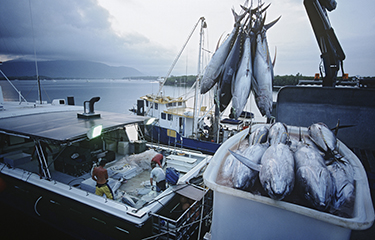A new report on labor abuses in the tuna-fishing industry points to “sustained abuse of workers” aboard vessels.
The report by the United Kingdom-based Business & Human Rights Resource Centre (BHRRC), “All at Sea: An Evaluation of Company Efforts to Address Modern Slavery in Pacific Supply Chains of Canned Tuna," found labor abuse issues were worsening as a result of increased demand for tuna during the global COVID-19 crisis, which has forced vessels to stay at sea for longer intervals.
The report by the also points to failings of certification systems in curbing labor rights issues, a rebuke of certification schemes’ ability to monitor labor abuses in the tuna industry.
“Too many Pacific tuna fishermen that put food on our tables face abuse and confinement every day. Put simply, the brands who put the cans on their shelves are failing to provide adequate duty of care to these workers who furnish their products,” BHRRC Executive Director Phil Bloomer said. “This is not inevitable. A handful of companies – Tesco, Thai Union, and Woolworths (Australia) – have shown it is both commercially viable and a moral imperative to emancipate workers caught in modern slavery. Other brands must catch up and take urgent action to protect workers. Investors should also note that the laggards not only run major reputation risk, but also imminent legal risk as new laws in 2021 will leave their negligence exposed to legal challenge.”
The fact that only one company – the U.S.-based retailer Kroger – reported that it had found evidence of modern slavery in its supply chain suggests a “catastrophic failure” of the existing social auditing system, according to the BHRRC.
The organization criticized what it called “glacial” progress on actions to end modern slavery at 35 mostly Western retail and distribution enterprises, which collectively operate 80 tuna brands.
“Change is happening far too slowly and only in a handful of brands have implemented measures necessary,” since they were surveyed in 2019, the BHRRC said.
The group said just six companies out of the 35 studied have initiated processes to stamp out forced labor in their supply chain: Ahold Delhaize, Coles, Conga Foods, Kaufland, REWE, and Woolworths. Separately, only Aldi (North and South), Bumble Bee and Thai Union have adopted the Global Dialogue on Seafood Traceability Standards set in 2020.
The other companies studied included: Clover Leaf Seafoods, Metro AG, Century Pacific Foods, Target, Simplot, Coles Group, Tri Marine, Kraft Heinz Australia, Organico Realfoods, Safcol, Tesco PLC, Walmart, Costco, Carrefour, Lidl, Starkist Co., Alliance Select Foods, American Tuna, Raincoast Trading Co., Wild Planet, Supervalu, Hi-Q Food Products, Ocean Brands, Pegasus Food, and C-Food International.
Despite increased availability of digital means for increasing transparency, the tuna supply chain remains opaque, the report said.
In response, the BHRRC is calling for governments to mandate tuna-sourcing companies put safeguards in place, including whistleblower mechanisms and protections for workers. However, that solution could potentially put importers in a bind, as they could be held liable under U.S. law for products produced using forced labor.
In recent years, increased attention has been placed on the issue of forced labor in seafood supply chains by the Environmental Justice Foundation and Greenpeace, with a focus on South Korean and Taiwanese fleets supplying major Western buyers.
Photo courtesy of sirtravelalot/Shutterstock







